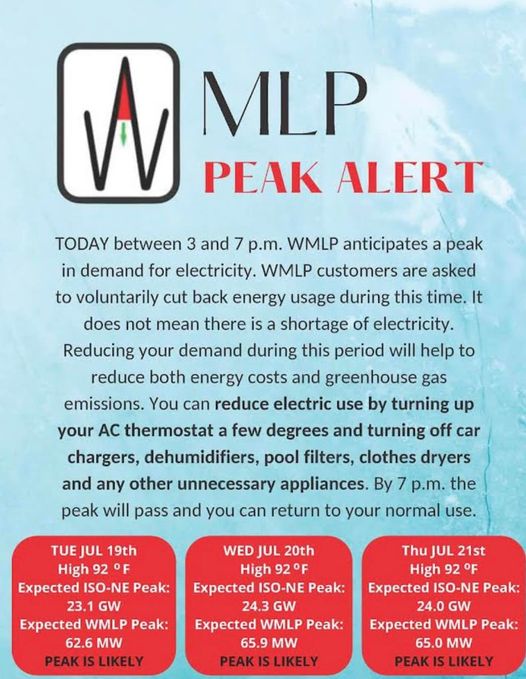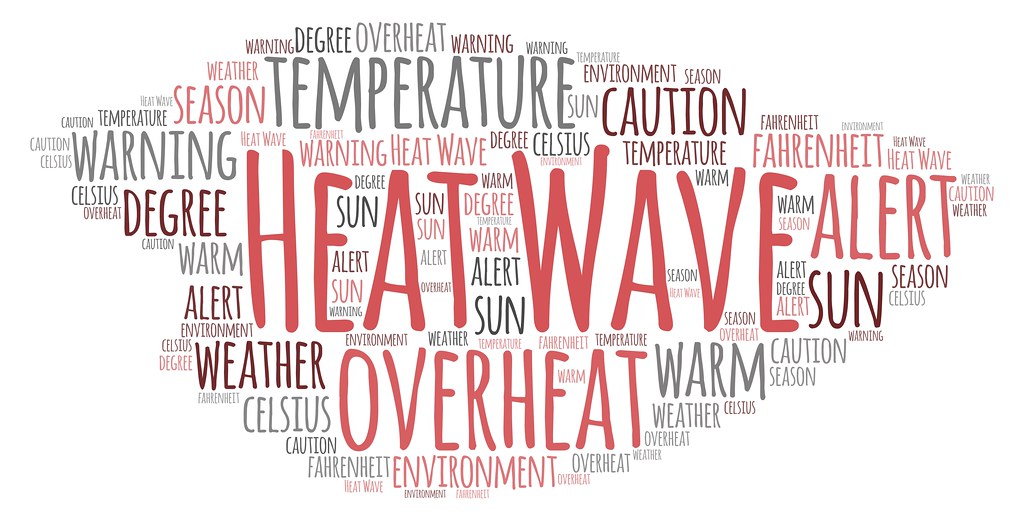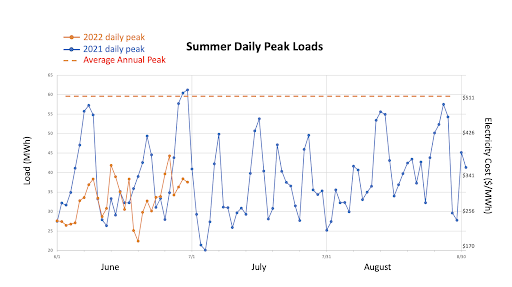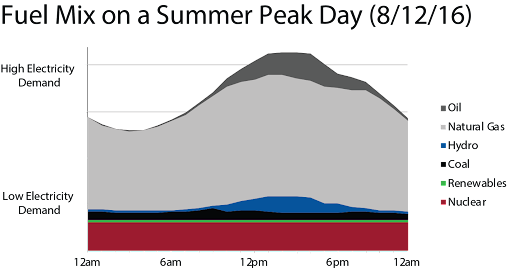|
Wellesley Municipal Light Plant (WMLP) is anticipating a peak in the demand for electricity on June 19 and June 20 due to predicted high temperatures.
Electricity use is expected to peak between the hours of 5:00 p.m. to 8:00 p.m. on both days. Customers are asked to voluntarily cut back on energy use during this time, to help shave the peak and save the planet. This does not mean there is a shortage of electricity. Reducing demand during this period will help reduce both energy costs and greenhouse gas emissions. Cut back electric use by turning up your air conditioner thermostat a few degrees, turning off car chargers, dehumidifiers, pool filters, clothes dryers, and other unnecessary appliances. By 8:00 p.m. the peak should pass and you can resume regular use. Please share this information with friends and neighbors. TODAY, tomorrow and Thursday between 3 p.m. and 7 p.m. the Wellesley Municipal Light Plant (WMLP) anticipates a peak in demand for electricity. WMLP customers are asked to voluntarily cut back energy usage during this time. It does not mean there is a shortage of electricity. Reducing electricity demand during this period will help to reduce both energy costs and greenhouse gas emissions. Customers can reduce electric use by waiting to charge Electric Vehicles, turning up your AC thermostat a few degrees, and postponing use of dehumidifiers, pool filters, clothes dryers and any other unnecessary appliances. By 7 p.m. the peak will pass and customers can go back to their normal use. Learn more here. Tips from Boston Globe to keep cool are here.
It’s that time of year again! Time for beach outings, barbecue gatherings, and boat excursions as well as a critical time to be aware of our electricity use and its impact on our electric rates and the environment.
During the hottest days of the summer months, as we crank up our ACs, our system-wide use of electricity reaches the highest, ‘peak’ levels for the year. To meet the extreme electric demand, the grid operator—ISO-New England—turns to “peaker plants,” the power generators of last resort. These power plants are generally the dirtiest and most expensive, running on gas and oil and selling their power at extremely high rates. Peaker plants are only necessary for the highest demand hours, about 2 – 7% of the year in full. In the graph below, you can see how the grid ramps up power from oil and gas peaker plants as electric demand grows. As demand grows, price skyrockets. At last summer’s price peak on June 30, wholesale electric prices per MWh were over ten times the average for the year. Peak hours have such a big impact on our electricity costs, that thirty percent of our electric bill is directly related to the amount of electricity Wellesley uses for just one hour during the entire year. That one hour is called the peak demand hour. Peak electricity is expensive and dirty—but you can help. Sustainable Wellesley and the Wellesley Municipal Light Plant (WMLP) encourage you to join the campaign to “shave the peak” this summer. The WMLP can usually predict when peak events will occur a day in advance, so you can plan to reduce demand during the hours of highest electric use. Sign up for Shave the Peak alerts and receive notifications through email (send an email to [email protected] with the subject and body blank), or follow them on Twitter, @MLPWellesley, to know when an electric demand peak is anticipated. Then it’s as easy as turning up your AC thermostat a few degrees or delaying usage of electrical appliances such as car chargers, dehumidifiers, pool filters, or clothes dryers until after the peak. This minimal commitment offers you an opportunity to practice mindfulness not only for yourself but the environment too. Help us meet our goal of reducing peak demand below our historic level! You can also track our campaign to reduce our peak on the WMLP website: Shave-the-Peak. After each peak event you can see how we did compared to our goal. Get your friends and family to join our campaign, and watch our peak shrink as your savings grow and Earth benefits. Reduce your Energy Use/Cost...Without Compromising Comfort!
Below are some tips on what you can do: Get an Assist from Mother Nature
Reduce Heat and Humidity Sources in the House on Hot Days
Improve Air Conditioner Management
Unlock $ With Sustainable Energy Investments • Replace out-dated air conditioners with air source heat pumps • Install a full-house attic fan and use cool evening air instead of air conditioning • Install a lighter colored roof and paint the house a lighter color that will reflect rather than absorb the warmth of the sun’s rays • Plant deciduous shade trees to block summer sun and provide cooling • Install awnings, shutters or trellises on the sunny side of the house • Better insulate the attic Interested in Cost and Energy Savings on Heating and Cooling? Hear from Experts Dec. 9th 7pm11/30/2021
Due to broad interest, Wellesley’s Municipal Light Plant has extended its pilot “Clean Comfort” program through June 30, 2022. Wellesley residents have been taking advantage of this program which offers personal, expert coaching as well as financial rebates to move to air source heat pumps. To learn more about this program and air source heat pumps, join a discussion with experts and users on December 9th at 7pm.
Register here for this 1 hour Zoom meeting to learn how you can save money and lower your carbon footprint. “The no cost coaching offered by the Town’s consultants Abode Energy Management, in combination with the incentives, made this transition easy,” said a Wellesley resident. If you are considering replacing oil furnaces or air conditioners, you may be particularly interested in this program. For those that have air source heat pumps, learn how to use them to their full capacity as well. View the Air Source Heat Pump Rebate Program Requirements. Can't make this event? You can watch the May 19th webinar here or the November 9th here. Have questions? Call 781-235-7600 or email [email protected]. Sustainable Wellesley is hosting this free webinar. The Town of Wellesley has a goal to reduce emissions to net zero by 2050, and buildings play a big part in reaching that goal as they emit 56% of our greenhouse gas emissions (58% of that comes from the residential sector). Learn how you can help Wellesley reach its goal, while lowering your heating and cooling costs and be more comfortable. Experts share information on:
This event is presented by Abode Energy Management in partnership with Northeast Energy Efficiency Partnerships (NEEP). Abode strives to support Municipal Light Plant customers in their adoption of clean heating and cooling technologies. NEEP is one of six Regional Energy Efficiency Organizations (REEOs) funded, in part, by US Department of Energy to support state efficiency policies and programs. To Register for the Event, click here. |
Categories
All
|
Sign up for updates! |
Contact |
Support us! |
Follow us!Copyright © 2024 By Sustainable Wellesley
|









 RSS Feed
RSS Feed